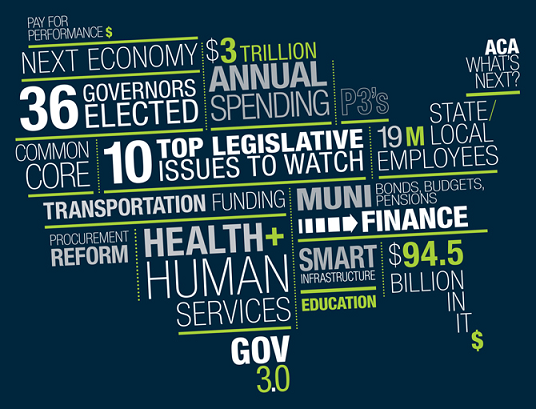
As part of Governing magazine’s “Outlook 2015 Event,” ICMA Executive Director Bob O’Neill joined Riki Hokama, president, National Association of Counties, and Brooks Rainwater, center director, National League of Cities, in a panel discussion on local government issues that are driving the nation’s policy agenda. The event attracted more than 200 journalists, private sector leaders, and public and nonprofit officials.
David Adkins, executive director of the Council of State Governments segued from the state outlook by saying, “A lot of the action is defaulting to the local level now.”
O’Neill commented that two things in particular have spurred local government reaction—the great recession and federal and state political gridlock. “No matter how big the issue—public safety, jobs, education, the environment—it all comes down to a person and a place. Lots of communities have decided to take control of their own destiny,” he said.
Highlights of O’Neill’s Remarks
- We love our local governments—we have 90,000 of them in this country. The challenge is how to preserve community identity and at the same time get the sufficient scale to address the issues that matter the most. Local governments need to show leadership and innovation around shared services; communities working together across boundaries. There are many opportunities to become more efficient and effective.
- States can create incentives to encourage shared services. As an example, when communities come together to create a strategic plan for a region, the state can supply incentives to make some of the elements in the plan happen.
- One of the most significant developments in recent years is the rise of big data. All of the panelists underscored the need for local governments to harness the power of data to improve service delivery to residents. O’Neill talked about the need to aggregate the data into a comparative database, something that ICMA is doing through ICMA Insights.
O’Neill pointed out that one of the most frustrating things is the glacial pace at which innovations that work are adopted by local governments. “With a national comparative database of performance metrics, adoption of practices that work could become much quicker, thereby improving service delivery or reducing costs on a more consistent basis." he said.
He added that one barrier for communities has been the costs of adopting a performance management system. “Through our partnership with SAS, a small community can enroll in ICMA Insights and begin managing and comparing its performance as part of the national database for under $800,” he said.
New, Reduced Membership Dues
A new, reduced dues rate is available for CAOs/ACAOs, along with additional discounts for those in smaller communities, has been implemented. Learn more and be sure to join or renew today!
